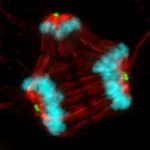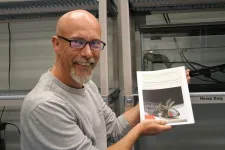(Press-News.org) Treatment with datopotamab deruxtecan (Dato-DXd), a novel Trop-2 directed antibody-drug conjugate, was found to significantly improve progression-free survival in patients with metastatic non-small cell lung cancer, an improvement that was primarily driven by patients with non-squamous tumors.
These results from the TROPION-Lung01 Phase III trial, which compared the standard of care in second-line docetaxel, a type of chemotherapy, with Dato-DXd, an antibody drug conjugate, in patients with pretreated metastatic non-small cell lung cancer, were presented at the European Society for Medical Oncology 2023 Congress by Dr. Aaron Lisberg, assistant professor of medicine and thoracic medical oncologist at the UCLA Health Jonsson Comprehensive Cancer Center and the David Geffen School of Medicine at UCLA.
Lisberg and the team found that patients treated with Dato-DXd experienced a 25% reduction in the risk of disease progression or death compared to patients treated with docetaxel.
“While there was an overall reduction of disease progression, the data clearly indicates that this benefit was primarily driven by patients with non-squamous tumors,” Lisberg said.
More than 75% of enrolled patients had non-squamous tumors, noted Lisberg. And in that group alone, the therapy reduced the risk of disease progression or death by 37%, while patients with squamous tumors did not appear to derive a therapeutic benefit from Dato-DXd on trial.
In addition, a trend in favor of Dato-DXd was observed in the interim overall survival analysis. In those assessments of how long a patient will live after receiving a therapy for their cancer, the improvement was most pronounced in the non-squamous population with a reduction in the risk of death of 23% with Dato-DXd.
The improvements in progression-free and overall survival observed in the Dato-DXd treated patients were accompanied by significant tumor shrinkage with Dato-DXd (26.4%) vs docetaxel (12.8%), a difference that was more pronounced in patients with non-squamous tumors (31.2% vs 12.8%).
The overall safety profile of Dato-DXd was superior to docetaxel as fewer patients had high grade drug related toxicities with Dato-DXd (25%) compared to docetaxel (41%). Common side effects of Dato-DXd included mild to moderate mouth sores and nausea. There were also fewer severe side effects leading to dose reduction or treatment discontinuation in Dato-DXd treated patients compared to those treated with docetaxel.
“Dato-DXd is the first antibody-drug conjugate in metastatic non-small cell lung cancer to demonstrate a statistically significant improvement in progression-free survival over the standard of care chemotherapy drug docetaxel, while evidencing a more favorable safety profile due to its unique ability to selectively delivers a potent chemotherapy directly into tumor cells,” said Lisberg.
These findings are encouraging, noted Lisberg, since the current standard of care second-line chemotherapy docetaxel is associated with modest benefit and substantial toxicity and suggest that Dato-DXd has the potential to be new therapy for patients with previously treated non-squamous non-small cell lung cancer.
TROPION-LUNG01 Study Design
Researchers on the global TROPION-LUNG01 trial compared the effectiveness and tolerability of Dato-DXd vs docetaxel by randomizing 604 patients to receive either Dato-DXd (299 patients) or docetaxel (305) patients. Patients both with and without genetic driver mutations such as EGFR were enrolled and must have received multiple therapies for metastatic non-small cell lung cancer prior to enrollment. No minimum level of TROP-2 expression on the tumor surface was required for enrollment, as TROP-2 expression has not been found to correlate with Dato-DXd effectiveness, to date.
UCLA Leadership in Dato-DXd Development
UCLA’s thoracic medical oncology team has been at the forefront of Dato-DXd’s global development punctuated by Lisberg’s ESMO 2023 TROPION-LUNG01 Presidential Symposium. Critical support has been provided by the Hematology/Oncology Clinical Research Unit, as well as Lisberg’s UCLA thoracic medical oncology colleagues Dr. Edward Garon, Dr. Jonathan Goldman, and Dr. Amy Cummings, who identified the potential of Dato-DXd early on in development and prioritized Dato-DXd for their heavily pretreated non-small cell lung cancer patients. These patients had a paucity of effective treatment options at the time of Dato-DXd trial enrollment and their participation was essential to the success of the TROPION-LUNG01 study, with many experiencing a prolonged improvement in their lives, as result of Dato-DXd. The TRIO-US network also made significant contributions to the TROPION-LUNG01 study under the direction of Lisberg.
UCLA and TRIO-US Network at Forefront of Future Dato-DXd Lung Cancer Trials
This antibody-drug conjugate is now being evaluated as potential first-line therapy for patients with newly diagnosed metastatic non-small cell lung cancer on the TROPION-LUNG07/08 studies (NCT05555732/NCT05215340), both of which were recently opened at UCLA clinics throughout Southern California. In addition, the TRIO-US network is participating in the TROPION-LUNG07 trial, as it did for TROPION-LUNG01. These trials hold the promise to improve clinical outcomes for patients with metastatic non-small cell lung cancer by providing Dato-DXd to an even larger number of patients with non-squamous tumors.
Datopotamab deruxtecan is a specifically engineered TROP2-directed DXd antibody drug conjugate being jointly developed by AstraZeneca and Daiichi Sankyo.
END
Antibody-drug conjugate helps patients with metastatic non-small cell lung cancer live longer, delaying disease progression
UCLA-led study shows a novel antibody-drug conjugate has the potential to be new therapy for patients with previously treated non-squamous non-small cell lung cancer
2023-10-27
ELSE PRESS RELEASES FROM THIS DATE:
UTHSC cancer researcher part of $3 million collaborative project studying obesity-related cancer
2023-10-27
A University of Tennessee Health Science Center (UTHSC) researcher is a member of a prestigious team that has just received a highly competitive Endeavor Award totaling $3 million from The Mark Foundation for Cancer Research.
Liza Makowski, PhD professor in Hematology and Oncology at the UTHSC Center for Cancer Research, is a co-principal investigator on the award, which funds collaborative projects tackling complex challenges in the prevention, diagnosis, and treatment of cancer. Entitled “Inflammatory Drivers of The Obesity-Cancer Connection”, the project is led by principal ...
Common chemotherapy drugs don't work like doctors thought, with big implications for drug discovery
2023-10-27
A new study from the University of Wisconsin–Madison suggests that chemotherapy may not be reaching its full potential, in part because researchers and doctors have long misunderstood how some of the most common cancer drugs actually ward off tumors.
For decades, researchers have believed that a class of drugs called microtubule poisons treat cancerous tumors by halting mitosis, or the division of cells. Now, a team of UW–Madison scientists has found that in patients, microtubule poisons don't actually stop cancer cells from dividing. Instead, these drugs alter ...
SynGAP Research Fund awards $100,000 for investigating the impact of SYNGAP1 missense variants using structural bioinformatics
2023-10-26
TURKU, Finland – October 27, 2023 – The SynGAP Research Fund 501(c)(3) announced a $100,000 grant to researchers Pekka Postila and Olli Pentikäinen from the Institute of Biomedicine and InFLAMES Flagship at the University of Turku. Prof. Pentikäinen’s research focuses on molecular modeling and computer-aided drug discovery. Assoc. Prof. Postila is an expert on advanced molecular dynamics simulations of complex biomolecular systems. The dual research team was formed to study the structural effects of missense variants on the SynGAP protein, whose normal functioning ...
Something to chew on: Researchers look for connections in how animals eat and digest food
2023-10-26
Oct. 26, 2023
Media contacts:
Emily Gowdey-Backus, director of media relations, Emily_GowdeyBackus@uml.edu
Nancy Cicco, assistant director of media relations, Nancy_Cicco@uml.edu
UMass Lowell’s Nicolai Konow wants to bridge the gap between research on food processing and nutrient absorption.
“There is a divide between biomechanists, who study chewing and food transport, and physiologists, who examine what actually happens to food in the gastrointestinal tract,” said the assistant professor ...
Viral reprogramming of cells increases risk of cancers in HIV patients
2023-10-26
Viral infections are known to be a central cause of more than 10% of cancers worldwide. University of California researchers may have uncovered one of the key reasons why. Their findings were published today in PLOS Pathogens, a journal that reports groundbreaking work to advance understanding of how pathogens impact diseases such as cancer.
UC Davis Comprehensive Cancer Center researcher Yoshihiro Izumiya teamed up with Michiko Shimoda, who previously worked in the Izumiya Lab at UC Davis. Currently, she is a member of the Core Immunology Lab at UC San Francisco. Together, they led UC Davis researchers in the study of Kaposi’s sarcoma-associated herpesvirus (KSHV). The ...
Robot stand-in mimics movements in VR
2023-10-26
Media Note: Pictures of VRoxy can be viewed and downloaded here: https://cornell.box.com/v/VRoxyrobotproxy
ITHACA, N.Y. – Researchers from Cornell and Brown University have developed a souped-up telepresence robot that responds automatically and in real-time to a remote user’s movements and gestures made in virtual reality.
The robotic system, called VRoxy, allows a remote user in a small space, like an office, to collaborate via VR with teammates in a much larger space. VRoxy represents the latest in remote, robotic embodiment.
Donning a VR headset, a user has access to two view modes: Live mode shows an immersive image of the ...
Major milestone achieved in new quantum computing architecture
2023-10-26
Coherence stands as a pillar of effective communication, whether it is in writing, speaking or information processing. This principle extends to quantum bits, or qubits, the building blocks of quantum computing. A quantum computer could one day tackle previously insurmountable challenges in climate prediction, material design, drug discovery and more.
A team led by the U.S. Department of Energy’s (DOE) Argonne National Laboratory has achieved a major milestone toward future quantum computing. They have extended the coherence time for their novel type of qubit to an impressive 0.1 milliseconds — nearly a thousand times better than the previous record.
“Rather ...
"Recognition of human right to the environment can galvanize action and collaboration towards realization of sustainable development goals," eminent environmental lawyer says
2023-10-26
Amsterdam, October 26, 2023 – "The Human Right to the Environment affirms the right to life itself. When humans protect nature, they are also securing human health and wellbeing." An article by eminent environmental lawyer Prof. Nicholas A. Robinson sees the recognition of the Human Right to the Environment (HRE) as a first step in a long process of restoring a healthy environment for people and the planet.
Professor Robinson’s article is published in a special issue of the Journal of Environmental Policy and Law on The Human Right to Sustainable Environment. In the preface Editor-in-Chief Bharat H. Desai, PhD, Jawaharlal Nehru University, Centre ...
New tool measures food security duration, severity
2023-10-26
ITHACA, N.Y. – Researchers from the Charles H. Dyson School of Applied Economics and Management have developed a new method for measuring food insecurity, which for millions of people in the U.S. is more than just an abstract concept.
The group’s probability of food security (PFS) measures the likelihood that a household’s food expenditures equal or exceed the minimum cost of a healthful diet. The researchers then put the PFS to the test, analyzing food security dynamics over a recent 17-year period, and found that a third of U.S. households experienced at least temporary food insecurity.
Seungmin Lee, a doctoral student in the field of applied economics and management, ...
Excess fluoride linked to cognitive impairment in children
2023-10-26
Long-term consumption of water with fluoride levels far above established drinking water standards may be linked to cognitive impairments in children, according to a new pilot study from Tulane University.
The study, published in the journal Neurotoxicology and Teratology, was conducted in rural Ethiopia where farming communities use wells with varying levels of naturally occurring fluoride ranging from 0.4 to 15.5 mg/L. The World Health Organization recommends fluoride levels below 1.5 mg/L.
Researchers ...
LAST 30 PRESS RELEASES:
Striking genomic architecture discovered in embryonic reproductive cells before they start developing into sperm and eggs
Screening improves early detection of colorectal cancer
New data on spontaneous coronary artery dissection (SCAD) – a common cause of heart attacks in younger women
How root growth is stimulated by nitrate: Researchers decipher signalling chain
Scientists reveal our best- and worst-case scenarios for a warming Antarctica
Cleaner fish show intelligence typical of mammals
AABNet and partners launch landmark guide on the conservation of African livestock genetic resources and sustainable breeding strategies
Produce hydrogen and oxygen simultaneously from a single atom! Achieve carbon neutrality with an 'All-in-one' single-atom water electrolysis catalyst
Sleep loss linked to higher atrial fibrillation risk in working-age adults
Visible light-driven deracemization of α-aryl ketones synergistically catalyzed by thiophenols and chiral phosphoric acid
Most AI bots lack basic safety disclosures, study finds
How competitive gaming on discord fosters social connections
CU Anschutz School of Medicine receives best ranking in NIH funding in 20 years
Mayo Clinic opens patient information office in Cayman Islands
Phonon lasers unlock ultrabroadband acoustic frequency combs
Babies with an increased likelihood of autism may struggle to settle into deep, restorative sleep, according to a new study from the University of East Anglia.
National Reactor Innovation Center opens Molten Salt Thermophysical Examination Capability at INL
International Progressive MS Alliance awards €6.9 million to three studies researching therapies to address common symptoms of progressive MS
Can your soil’s color predict its health?
Biochar nanomaterials could transform medicine, energy, and climate solutions
Turning waste into power: scientists convert discarded phone batteries and industrial lignin into high-performance sodium battery materials
PhD student maps mysterious upper atmosphere of Uranus for the first time
Idaho National Laboratory to accelerate nuclear energy deployment with NVIDIA AI through the Genesis Mission
Blood test could help guide treatment decisions in germ cell tumors
New ‘scimitar-crested’ Spinosaurus species discovered in the central Sahara
“Cyborg” pancreatic organoids can monitor the maturation of islet cells
Technique to extract concepts from AI models can help steer and monitor model outputs
Study clarifies the cancer genome in domestic cats
Crested Spinosaurus fossil was aquatic, but lived 1,000 kilometers from the Tethys Sea
MULTI-evolve: Rapid evolution of complex multi-mutant proteins
[Press-News.org] Antibody-drug conjugate helps patients with metastatic non-small cell lung cancer live longer, delaying disease progressionUCLA-led study shows a novel antibody-drug conjugate has the potential to be new therapy for patients with previously treated non-squamous non-small cell lung cancer



